Share this
How to manage your Imposter Syndrome
by Nick Gubb on 18 September 2023
Welcome to part two of this two-part series on Imposter Syndrome. In this final part, Nick Gubb writes about how you can manage your Imposter Syndrome.
Understanding more about the symptoms and impacts of Imposter Syndrome, I could recognise how the imposter cycle was unconsciously running itself in a constant loop for a fair chunk of my day-to-day workload.
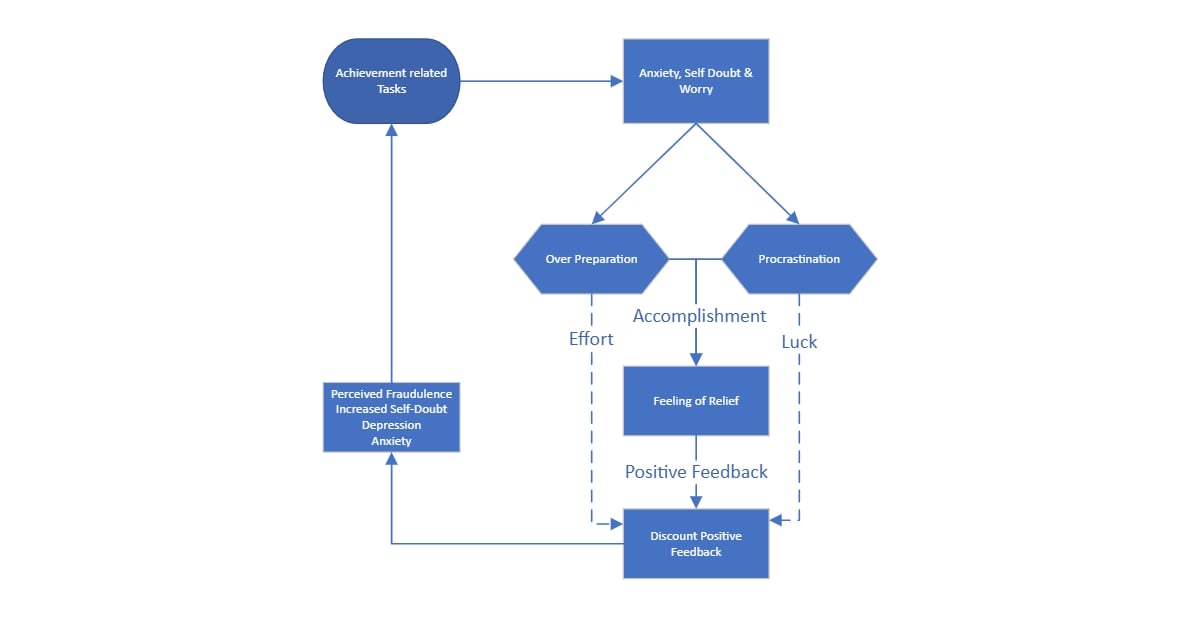
It all started to make sense.
When I had something to deliver, anxiety and self-doubt would kick in, leading to two options: procrastinate and defer it or go overboard with the preparation.
After finishing the task, I felt relieved that I had completed it and it hadn't gone pear-shaped.
Following this feeling was the realisation that I was only "successful" due to a streak of luck. Or the sense that the sheer amount of effort I had to put in was masking my lack of skills.
I would also discount the positive feedback provided and carry the anxiety into the next piece of work.
Once I recognised the symptoms and behaviour, I was relieved that I was (mostly) normal, but I still needed to stop or at least limit its effects. Dr Valerie Young categorised it into five groups, each with its tailored approach to dealing with the issues:
- The Perfectionist sets excessively high goals for themselves.
- The Superhero pushes to work harder and harder.
- The Natural Genius judges success based on their abilities instead of their efforts.
- The Rugged Individualist feels asking for help reveals their phoniness.
- The Expert feels like they tricked their employer into hiring them.
The following are the slides with a more detailed description for each group:
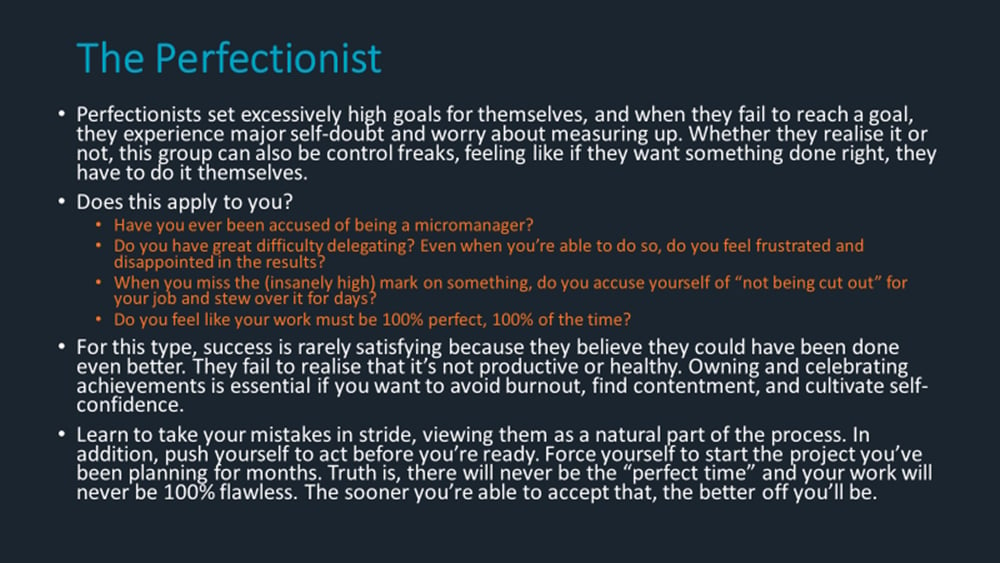
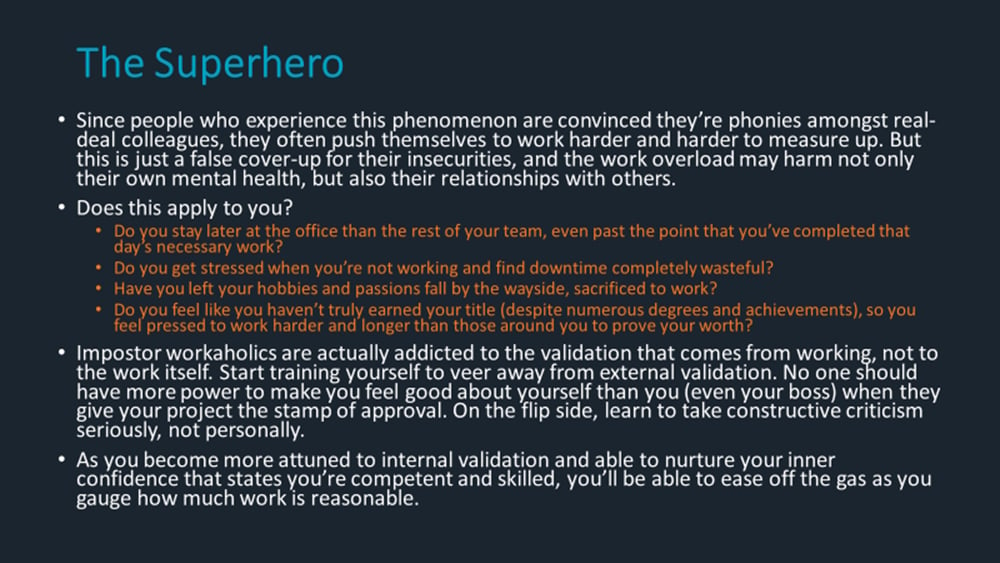
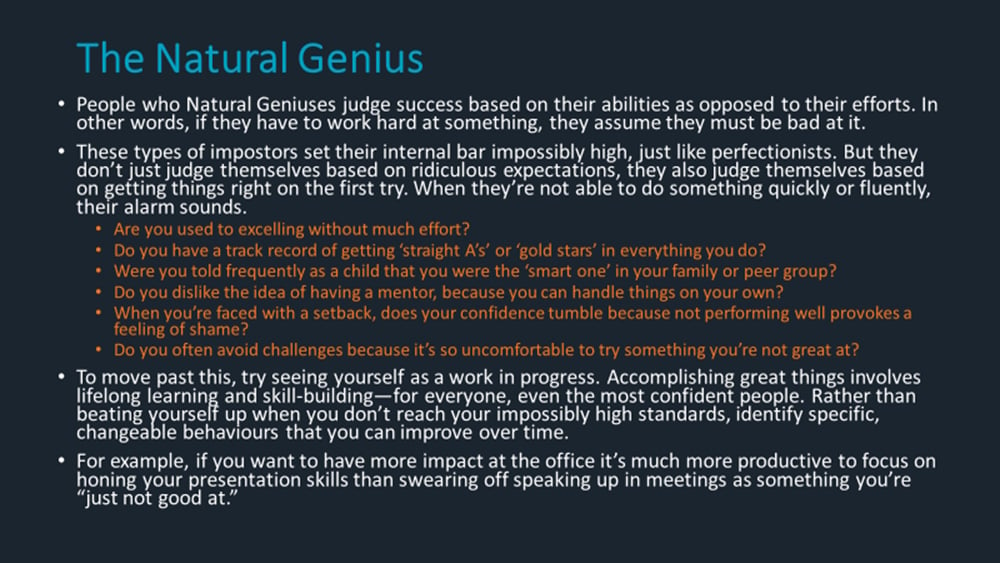
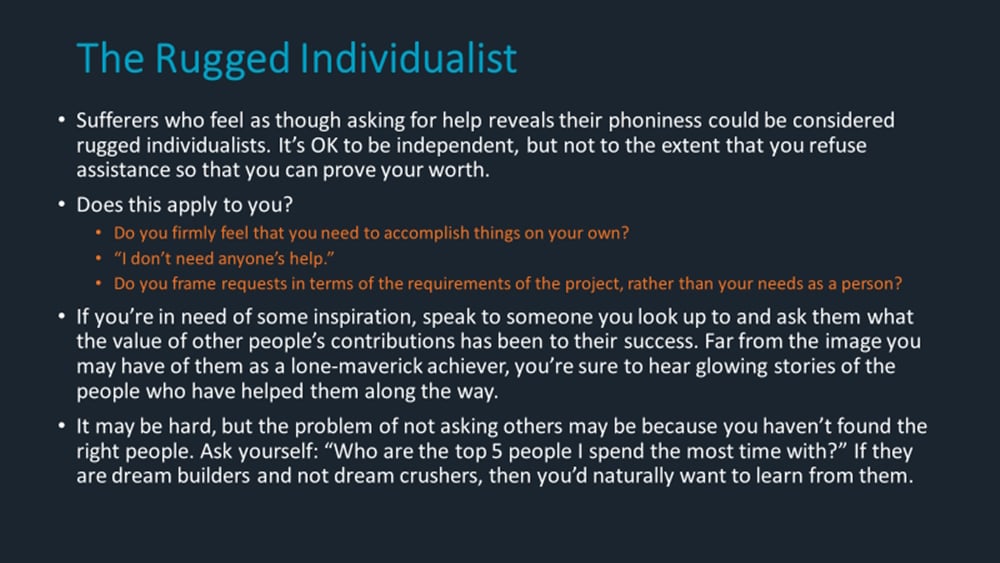
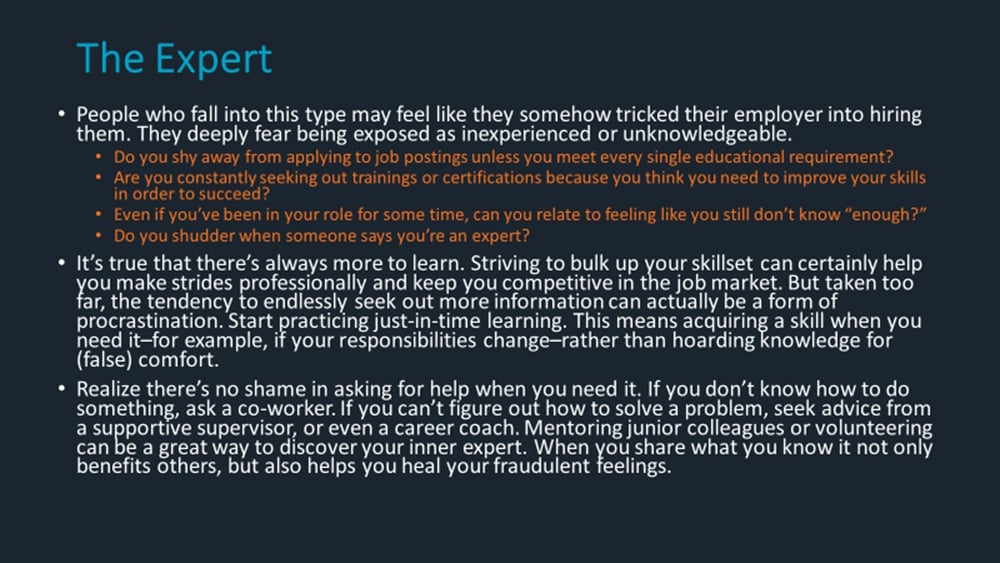
Having identified traits from each category that seemed to fit, I was worried that I had formed some Imposter Voltron or Captain Planet. On closer inspection, I leaned towards one type more than the others.
In conjunction with a better understanding of the Imposter loop, it was time to break the cycle.
For me, it was all about listening to the people that surrounded me. Being lucky enough to have a couple of high-quality friendships at work meant I already had an 'in' to reducing the isolation that Imposter Syndrome creates. After some honest conversations, I didn't feel entirely alone in dealing with secrets of incompetence.
I started by pinching some ideas from psychologists with a wealth of information gained through their studies of high-performing people and understanding how their self-efficacy might help me.
It's the stuff we all intuitively know we should be doing, such as:
- Setting high goals
- Welcoming and thriving on challenge
- Remaining self-motivated
- Putting sufficient effort into accomplishing our goals
- Persevering through obstacles
But how would I adapt that to the next task I had to deliver?
I started recording my successes. You are already achieving success in other parts of your life. Start taking note of them. It was as simple as having a folder in my email client to which I would move the 'thank you' or 'well done' emails.
Every so often, I would read through them, and it would help me to remember the stuff I've done that people enjoyed, found helpful, or were glad to have received. As an added benefit, it also prepared me for the annual performance review session, where I could discuss my achievements.
I learned from and observed others. Watching a few people I respected in navigating and achieving success was helpful. When they mess up, find out why. Ask what strategies they used to get back on their feet.
Surround yourself with awesome people. This is much easier if you have a good culture at work, but having a selection of colleagues who support and encourage you is a brilliant way to give that worried voice in your head some much-needed competition. The same people will often see why you succeeded at something you may have overlooked.
It's all about turning your inner critic into a coach. It's impossible to shut down your inner critic completely, but instead, I tried turning the internal criticism into something more constructive.
- Label the feelings and anxieties you have when they happen.
- Talk about them. This part isn't easy, but it's another important reason for having those great social connections at work. We all need someone who can listen when we're struggling.
- Figure out the root causes. Now that you know your feelings, it's time to figure out why. What situations, people, or challenges bring your inner critic out of the woodwork? What's the underlying pattern here?
- Have some self-compassion. Many people think they aren't cut out for their roles at some point or another in their careers. You aren't alone. Being too self-assured can be a liability of a different sort. Go easy on yourself and remember that with some practice and self-awareness, you can get past this, too.
People tend not to talk about their struggle with Imposter Syndrome because they believe they're the only ones experiencing it. Almost everyone who's ever confronted big challenges has felt that way. The more we communicate about our fears and anxieties, and the wiser we are about how they operate, the easier they'll be to shrug off the next time they pop up. It's a game of whack-a-mole that we can win.
Part 1: Imposter Syndrome Or: Am I doing it right?
Use the Subscribe by email box on this page to receive a notification when other blog posts go live.
Share this
- Agile Development (84)
- Software Development (66)
- Scrum (39)
- Business Analysis (28)
- Agile (27)
- Application Lifecycle Management (26)
- Capability Development (20)
- Requirements (20)
- Solution Architecture (19)
- Lean Software Development (17)
- Digital Disruption (16)
- IT Project (15)
- Project Management (15)
- Coaching (14)
- DevOps (14)
- Equinox IT News (12)
- IT Professional (11)
- Knowledge Sharing (10)
- Strategic Planning (10)
- Agile Transformation (9)
- Digital Transformation (9)
- IT Governance (9)
- International Leaders (9)
- People (9)
- IT Consulting (8)
- AI (7)
- Cloud (7)
- MIT Sloan CISR (7)
- ✨ (7)
- Change Management (6)
- Azure DevOps (5)
- Innovation (5)
- Working from Home (5)
- Business Architecture (4)
- Continuous Integration (4)
- Enterprise Analysis (4)
- FinOps (4)
- Client Briefing Events (3)
- Cloud Value Optimisation (3)
- GitHub (3)
- IT Services (3)
- .Net Core (2)
- Business Rules (2)
- Data Visualisation (2)
- Java Development (2)
- Security (2)
- System Performance (2)
- API (1)
- Automation (1)
- Communities of Practice (1)
- Kanban (1)
- Lean Startup (1)
- Microsoft Azure (1)
- Satir Change Model (1)
- Testing (1)
- January 2026 (2)
- November 2025 (1)
- August 2025 (3)
- July 2025 (3)
- March 2025 (1)
- December 2024 (1)
- August 2024 (1)
- February 2024 (3)
- January 2024 (1)
- September 2023 (2)
- July 2023 (3)
- August 2022 (4)
- July 2021 (1)
- March 2021 (1)
- February 2021 (1)
- November 2020 (2)
- July 2020 (1)
- June 2020 (2)
- May 2020 (2)
- March 2020 (3)
- August 2019 (1)
- July 2019 (2)
- June 2019 (1)
- April 2019 (2)
- October 2018 (1)
- August 2018 (1)
- July 2018 (1)
- April 2018 (2)
- January 2018 (1)
- September 2017 (1)
- July 2017 (1)
- February 2017 (1)
- January 2017 (1)
- October 2016 (2)
- September 2016 (1)
- August 2016 (4)
- July 2016 (3)
- June 2016 (3)
- May 2016 (4)
- April 2016 (5)
- March 2016 (1)
- February 2016 (1)
- January 2016 (1)
- December 2015 (5)
- November 2015 (11)
- October 2015 (3)
- September 2015 (1)
- August 2015 (1)
- July 2015 (7)
- June 2015 (7)
- April 2015 (1)
- March 2015 (2)
- February 2015 (2)
- December 2014 (3)
- September 2014 (2)
- July 2014 (1)
- June 2014 (2)
- May 2014 (8)
- April 2014 (1)
- March 2014 (2)
- February 2014 (2)
- November 2013 (1)
- October 2013 (2)
- September 2013 (2)
- August 2013 (2)
- May 2013 (1)
- April 2013 (3)
- March 2013 (2)
- February 2013 (1)
- January 2013 (1)
- November 2012 (1)
- October 2012 (1)
- September 2012 (1)
- July 2012 (2)
- June 2012 (1)
- May 2012 (1)
- November 2011 (2)
- August 2011 (2)
- July 2011 (3)
- June 2011 (4)
- April 2011 (2)
- February 2011 (1)
- January 2011 (2)
- December 2010 (1)
- November 2010 (1)
- October 2010 (1)
- February 2010 (1)
- July 2009 (1)
- October 2008 (1)